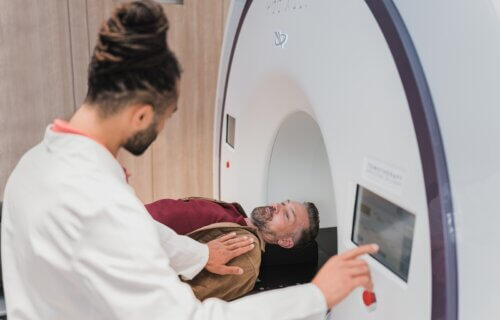LONDON — Recent studies suggest that MRI scans could detect prostate cancer that might otherwise get overlooked during standard screenings. Oncologists from University College London recommend routinely using MRI as a primary screening tool without requiring men to make a specific request. Adopting this approach could reduce both the death rate from prostate cancer and the rate of overtreatment.
Typically, for further tests like a biopsy to be considered, men showing prostate cancer symptoms need a prostate-specific antigen (PSA) score exceeding 3ng/ml. Elevated levels of this protein could suggest the presence of cancer.
Yet, MRI scans have revealed that 50 percent of men with severe prostate cancer had PSA levels below 3ng/ml. Under the existing system, these individuals would not have been eligible for additional testing, thereby possibly missing a diagnosis.
Researchers found that 16 percent of the study participants had undiagnosed prostate cancer with an average PSA density of just 1.2ng/ml. Roughly two-thirds of these men would not have met the 3ng/ml referral threshold as per the current guidelines.
Of the 303 men between 50 and 75 years-old assessed by the United Kingdom’s National Health Service, 29 (or 9.6%) were diagnosed with cancer requiring intervention, while three had low-risk cancer that did not warrant further action. In total, 48 men tested positive for prostate cancer.
“The thought that over half the men with clinically significant cancer had a PSA less than 3 ng/ml and would have been reassured that they didn’t have cancer by a PSA test alone is a sobering one and reiterates the need to consider a new approach to prostate cancer screening,” says Professor Caroline Moore, from the UCL Surgical & Interventional Science and consultant surgeon at UCLH and the chief investigator of the study, in a media release.
“Our results give an early indication that MRI could offer a more reliable method of detecting potentially serious cancers early, with the added benefit that less than one percent of participants were ‘over-diagnosed’ with low-risk disease. More studies in larger groups are needed to assess this further.”

Historically, the standard protocol consisted of a PSA test followed by a digital rectal exam. If cancer was suspected, a biopsy was conducted. This method decreased prostate cancer mortality by 20 percent over 16 years. Nevertheless, it’s been linked with over-diagnosis, excessive treatment for less aggressive cancers, and potentially unwarranted and invasive biopsies.
MRI scans have already prevented one in four high-risk men from undergoing unnecessary biopsies. Notably, the trial’s recruitment data showed that Black men participated at just one-fifth the rate of White men, highlighting the importance of targeted research initiatives.
The study is part of the REIMAGINE consortium, which aims to transform prostate cancer diagnosis. The researchers plan to broaden their study and are particularly keen on recruiting more Black participants.
“One in four Black men will get prostate cancer during their lifetime, which is double the number of men from other ethnicities. Given this elevated risk, and the fact that Black men were five times less likely to sign up for the REIMAGINE trial than White men, it will be crucial that any national screening program includes strategies to reach Black men and encourage more of them to come forward for testing,” says Saran Green, an author of the study from King’s College London.
Proposed solutions include mobile “scan in a van” initiatives, aiming to reach communities less inclined to respond to traditional invitations from doctors.
“The UK prostate cancer mortality rate is twice as high as in countries like the US or Spain because our levels of testing are much lower than other countries. Given how treatable prostate cancer is when caught early, I’m confident that a national screening program will reduce the UK’s prostate cancer mortality rate significantly. There is a lot of work to be done to get us to that point, but I believe this will be possible within the next five to ten years,” concludes Professor Mark Emberton from UCL Surgical & Interventional Science and a consultant urologist at UCLH.
You might also be interested in:
- Eating healthy won’t guarantee men avoid prostate cancer — even on the Mediterranean diet
- ‘FEVER’ pitch: New MRI approach improves detection of arm injuries among MLB pitchers
- New prostate cancer pill for advanced cases gives men new hope of survival
South West News Service writer Pol Allingham contributed to this report.

